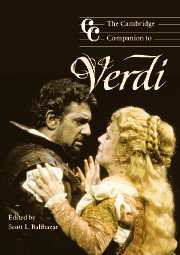Book contents
- Frontmatter
- Part I Personal, cultural, and political context
- 1 Verdi's life: a thematic biography
- 2 The Italian theatre of Verdi's day
- 3 Verdi, Italian Romanticism, and the Risorgimento
- Part II The style of Verdi's operas and non-operatic works
- Part III Representative operas
- Part IV Creation and critical reception
- Notes
- List of Verdi's works
- Select bibliography and works cited
- Index
1 - Verdi's life: a thematic biography
from Part I - Personal, cultural, and political context
Published online by Cambridge University Press: 28 September 2011
- Frontmatter
- Part I Personal, cultural, and political context
- 1 Verdi's life: a thematic biography
- 2 The Italian theatre of Verdi's day
- 3 Verdi, Italian Romanticism, and the Risorgimento
- Part II The style of Verdi's operas and non-operatic works
- Part III Representative operas
- Part IV Creation and critical reception
- Notes
- List of Verdi's works
- Select bibliography and works cited
- Index
Summary
Giuseppe Verdi, born in a country village in the Po Valley in 1813, rose to become the most popular opera composer of his century. Across a career that spanned more than sixty years he won international fame, becoming the venerated and often decorated grand old man of Italy, “il gran vegliardo.” Setting his stamp on two generations of performers, he transformed a showcase for prime donne and celebrated tenors into a serious theatre for singing actors. A patriot, Verdi was twice elected to political office and was honored as Senator for Life. He was also a farmer and philanthropist. At his death in 1901, he left behind a legacy of landmark works. Verdi's art has remained as accessible and popular as it was during his lifetime, his major operas constituting the backbone of today's standard repertory. Three of his homes and the home of Antonio Barezzi, his patron and father-in-law, are open to the public as museums. Now, as before, Verdi speaks to us all, even as he remains a beloved symbol of Italy and its culture, a man for his time and ours.
The child, the village, and the land
Verdi was born on October 10, 1813, in Roncole, a hamlet standing in open land about sixty-five miles southeast of Milan with the Apennines looming on the south and west and the River Po flowing to the north, where most income came from wheat, corn, and hogs. In this world of flat fields edged by rows of Lombardy poplars and irrigation canals, the only large buildings were the parish churches, among them Verdi's San Michele Arcangelo in Roncole. The people there spoke a sweet, liquid dialect that was heavily influenced by French and was the only spoken language of Verdi’s early years. Peaceful today but chaotic during Verdi’s infancy, the area was overrun with troops fighting the NapoleonicWars.
- Type
- Chapter
- Information
- The Cambridge Companion to Verdi , pp. 1 - 14Publisher: Cambridge University PressPrint publication year: 2004



